- Home
- Gaelen Foley
Duke of Scandal (Moonlight Square, Book 1) Page 7
Duke of Scandal (Moonlight Square, Book 1) Read online
Page 7
“Yes.”
An idle pause while he contemplated her. “And who is she, exactly?”
“Do you know Major Peter Carvel?”
“Heard of him. Gentleman soldier turned explorer. You’re funding his expedition, no?”
Jason nodded. “Great friend of mine since boyhood. That’s his sister. Known her all my life. I’m keeping an eye on her for him while he’s away.”
“Now there’s a pleasant task.” Rivenwood was now studying Felicity intently through narrowed eyes. “What is her lineage?”
“Why do you want to know?” he asked, forcing a tone of amusement, though his thoughts were otherwise.
Don’t even think about it. You’re too damned strange.
Now, now, he scolded himself. The attentions of multiple dukes would help any girl in Society. Even dukes known as scandal hounds and spooky quizzes.
Rivenwood waited.
“She’s the niece of the Marquess of Bellingham,” Jason told him.
“Ah, so she’s Elmont’s cousin.”
“Yes.” They exchanged a knowing look, having both heard the stories about that particular dandy.
Rivenwood furrowed his brow. “If Elmont doesn’t sire an heir, isn’t Major Carvel next in line for the title?”
“Yes. Lord Bellingham only has the one son.”
“Hmm,” said Rivenwood.
Thankfully, Lord and Lady Pelletier stood up in front of the orchestra before his friend asked any more probing questions about Felicity. Jason found himself wanting to keep every luscious detail about her all to himself.
Their hosts were all smiles as they faced their two roomfuls of guests to introduce the evening’s entertainment. Egads, they were holding hands in front of everyone.
Jason furrowed his brow, slightly embarrassed for them. It was ghastly unfashionable how in love they were, despite having been married for more than twenty years. Pelletier did not keep a mistress, and not even Byron had succeeded with the lively countess. They were that rare thing in the ton called faithful.
Lady Pelletier was the real music aficionado, as Jason knew from the friendly tug-of-war they’d had over Herr Schroeder. Alas, Her Ladyship’s charm had won out with the German over Jason’s money.
Their hostess welcomed everyone to their home, thanked them all for coming, and reminded them of the light supper that would be served at the end of the recital. The earl said nothing, just stood there beside his wife, gazing at her with a doting look that said, Ain’t she clever?
“And now I give you our dear Herr Schroeder,” she finished. Then she and her lord skipped off to their seats.
The German bowed to the audience, then took his seat at the pianoforte across from the other two members of the trio, on violin and cello. The rest of the ensemble waited in the background for their cue.
Schroeder looked at his fellow soloists, and all at once, they launched into the Sonata in G major by the crowd-pleasing Ignaz Pleyel.
It was a smart way to start off the performance and warm up the crowd before unveiling his new piece, Jason thought. The light, charming composition showcased the famous Austrian composer’s hallmark sweetness.
Jason watched Felicity enjoying the music and felt an idiotic glow of warmth stealing into his heart. The entire atmosphere of the room had changed for him with her arrival.
The sense of drifting through Society unanchored had vanished, and he congratulated himself on his foresight in placing her well in view.
That girl wants out of mourning, he thought with a private smile. Her head was bobbing to the music, and she sent him a big grin, as though delighted with her excellent view.
So was he.
He had offended several people by reserving that seat for her, but it was worth it to see her happy, especially after all she had been through of late.
She was clearly enjoying the music, but then, everybody liked Pleyel. It was popular, uncomplicated music that everyone had surely heard before at some point, and did not ask much of its hearers.
Jason didn’t mind such stuff, but as a discriminating aficionado, he reserved the full measure of his admiration for the wild, moody brilliance of Beethoven. He had read that the famed composer’s London publisher had just released the sheet music for a new piano concerto fresh from the maestro’s pen. Jason had not yet heard it played.
The tempestuousness of Beethoven’s music comforted his own stormy soul, but what he liked best about the master on the whole was how Beethoven did not try to please everybody. In that regard, at least, Jason felt he had one small thing in common with the genius. Then he thrust the towering figure out of his mind, as it wasn’t fair to Schroeder to make comparisons with the man’s own efforts next on the program.
There was applause after the third and final movement of the Pleyel sonata, and then Herr Schroeder’s moment came.
His fingers alighted on the keyboard, unleashing a delicate, arpeggiated cantabile, full of the feeling and tenderness common to the nocturne form. As the single movement developed, gathering intensity, soon Schroeder’s hands were racing up and down the keys with passionate force.
Hmm, Jason thought, impressed. Didn’t know he had it in him.
He glanced over at Felicity to get her impression. She was staring at the performance, tapping her toe in time with the tempo…and Jason somehow became fixated on watching that dainty, slippered foot bobbing up and down.
The wicked drift of his imaginings was, in his defense, not intentional. He barely noticed it at first, paying more attention to the music than the impulses forming in his brain.
Well, not his brain, exactly. Other regions of his person.
Watching that lovely little foot rocking up and down, he imagined sliding his finger into her shoe, tickling the arch a bit, guiding it off her, perhaps. And then his mind flitted further into forbidden territory as he realized he could just make out the slim line of her ankle each time her foot lifted with the rhythm.
The hint of ankle made him inevitably think of her silk stockings. Were they black to match her mourning? Or virginal white? Or pink, perhaps? With lace? His wonderings filled his fancy with an alluring fascination. He pondered skimming his fingers up her calves to touch her ribbon garters, which he decided would be blue.
His body began to feel hot as he imagined untying them with his teeth. A faint sweat dampened the back of his cravat as the mental picture of her elegant knees only made him want to part them. And then…
His heart was now pounding, but music apparently was the food of love. Or at least lust. Because he could not stop—and didn’t try very hard, in truth—from imagining what happened next between them.
The room had disappeared and all the people, her chaperone most especially. His pulse hammered as he stared, unmoving, at this woman he’d wanted for so long. In his fantasy, it was only the two of them and a plush piece of furniture atop which she reclined on her elbows, watching his every move with the same fire he had seen in her eyes so many times when she had looked at him over the years. For he might pretend not to notice, liar that he was, but he was well aware she wanted him, too. Had wanted him for a long time. This understanding was not born of arrogance but of torturous self-denial. He’d known he would only hurt her if he gave in to it. But in his nocturne fantasy, Jason had yielded completely. He set those pretty feet on his shoulders as he knelt down before her, lifting her black skirts and kissing his way up her thighs.
He was nearly panting where he sat, legs crossed to try to hide his swelling member. Mentally cursing the current fashion of tight pantaloons, he watched her ravenously in real life, flinched when she licked her lips, then went on teaching her pleasure in his mind’s eye.
He was horrified at himself but past caring. He had never claimed to be a good man.
All the same, he was relieved—and extraordinarily frustrated—when the piece ended. No wonder some said the new Romantic music was dangerous, the same claim they’d made of the poetry and the novels.
Thankfully, the emotional intensity of Schroeder’s new piece backed off when the ensemble took up J.C. Bach’s Piano Concerto no. 5 in E-flat major. The cooling logic and light, orderly elegance from “the London Bach” helped Jason scrape his wits and his one shred of decency back together.
By the time it ended, he was no longer throbbing.
Now he just felt guilty. Not only had he mentally deflowered his best friend’s little sister, yet again, he had failed to pay the proper attention to Schroeder’s key change, as the man had asked.
Damn.
For the final performance of the first half of the concert, they rolled the harp forward, and a popular tenor of the London stage stepped up to perform several of the Irish Melodies by Lord Byron’s friend, Thomas Moore.
One could never fault an Irish folk song, Jason conceded, but he personally could have done without all the melancholy crooning.
The first song moaned with sorrow over some green valley back in Ireland, where the singer’s young beloved had been buried.
Why was it everyone died tragically in Irish songs? he mused. English as he was, it seemed to him that in their music, the Irish, for all their charm, were always either homesick or ready to get into a fight. And indeed, next came the patriotic war song, right on schedule, though, of course, being of the tragical persuasion, “The Minstrel Boy” died, too.
The third piece was different—a touching musical reassurance from an old husband to his aging wife that he’d still adore her even if she lost her looks.
And after all this naked sentimentality, thank God, the singer livened things up to close the first act of the night with some cheeky Irish humor.
A few bouncy bars introduced the well-known favorite “When Love is Kind.”
When Love is kind,
Cheerful and free,
Love’s sure to find
Welcome from me.
But when Love brings
Heartache and pang,
Tears and such things—
Love may go hang!
“Hear, hear!” a few young bucks in the room agreed, applauding between verses. Laughter rippled through the room. Even the rakes knew the words, Jason thought in amusement, for such rollicking fare often served as tavern songs. Verse two proceeded.
If Love can sigh
For one alone,
Well pleased am I
To be that one.
But should I see
Love giv’n to rove
To two or three,
Then—goodbye, Love!
Felicity looked over at Jason meaningfully and arched a brow.
What? he mouthed at her, feigning innocence.
Her knowing smile reminded him of certain Gingers and Velvets of his acquaintance. Humph.
He heeded verse three.
Love must, in short,
Keep fond and true,
Through good report,
And evil too.
Else, here I swear,
Young Love may go,
For aught I care—
To Jericho!
Enthusiastic applause burst out and the tenor bowed. Then came the intermission. Jason longed to rush over to Felicity’s side, but still suffering the pangs of a guilty conscience after his delicious little fantasy, he was all the more cognizant of the likely result should he seem too attentive.
In the interests of not causing a scandal—and for the sake of that rare virtue prudence—he hung back, thinking he would let a little time pass before he sauntered over.
Alas, his reticence proved a mistake.
Within moments, the lovely and highly eligible Kirby heiress was swarmed with introductions to a dizzying array of bachelors, all moving in en masse to make her acquaintance.
He was annoyed, of course, but he couldn’t help smiling about it in spite of himself.
Good for you, girl.
After weeks of grieving and what truly had to have been long, tedious years of meekly attending the bossy old dragon, at last she was getting the chance to come out of Her Ladyship’s shadow and stand in the sun. Add to that all her worry about her brother and she deserved the pleasure of all the admiration suddenly pouring her way.
When she happened to catch Jason’s eye, he lifted his glass to her in a silent toast. Let her enjoy the attention, he thought. He could always see her later. If he knew women, nothing cheered a girl up more than being told she was beautiful by eligible men.
Which this one absolutely was.
Ah, well. So much for his hopes of playing her knight in shining armor. It was oddly depressing to see she didn’t need him at all, really. The papers he’d looked at yesterday were perfectly well in order, her cousins had been easily scared off, and she didn’t need his help in Society, since it looked like everyone suddenly wanted to meet her, even though she was not new to the ton.
The bleeders just hadn’t quite noticed her until the twenty thousand had dropped into her lap.
Thankfully, the dour presence of her chaperone, along with her black mourning clothes, seemed to restrain the bachelors who had now walled her in, at least somewhat. Jason still monitored the group, protectively keeping watch over her from a distance, even as he and Rivenwood got up to stretch a bit and hunt down another drink.
“Miss Carvel has become quite popular,” his fellow duke remarked.
“Yes. Would you like to meet her?”
He shrugged. “Why not.”
But before he could take the tall, tow-headed peer over for an introduction, the man got to chatting with some others, and then Jason had to nudge him.
“There is a young raven-haired beauty by the wall who’s been staring at you all this time,” he informed him discreetly. “Who the deuce is she?”
“Oh, not again.” Rivenwood turned around and spotted the girl, who flicked her fan as though to hide her face and spun away the moment she realized she’d been seen. “This is really getting rather tiresome,” the other duke grumbled. “I do wish she’d stop spying on me.”
“Who is she and what does she want with you?” Jason persisted, intrigued.
Rivenwood arched a brow. “Well, we have never been formally introduced, but to the best of my knowledge—and this is but a guess—that is Lady Serena Parker.”
“And?” Jason prodded.
“And I suppose she has recently discovered that we were once betrothed.”
“What?”
“As children. Ah, it doesn’t signify,” he said with an elegant wave of his hand. “The thing’s long since been nullified. It was arranged by our parents, and as you’ve probably heard, the lot of them were quite mad.”
A trill on the high notes of the pianoforte summoned the guests back to their seats for the second half of the night’s entertainment.
“Your fiancée?” Jason remarked as they sat down again.
“Ah, not since I came of age—she was just a child then, herself. I have a feeling she only stares at me out of morbid fascination, to ponder the fate she barely escaped.” Rivenwood shrugged in amusement. “Beyond that, I cannot fathom why she’s started stalking me of late. She’s got another beau by now, in any case.”
“I’m not surprised to hear it,” Jason said, intrigued.
Then Lady Pelletier bustled back to her spot before her guests and cheerfully hushed them for the next portion of the musicale. As they settled in, people were murmuring curiously to one another about the surprise performer, soon to be revealed.
But first, up to the pianoforte went their daughter, the decidedly mousy Lady Simone, who had made her debut the year before but still looked terrified of everyone. She curtsied to the audience, wide-eyed, then sat down at the bench and played a couple of short, charming sonatinas by Muzio Clementi to demonstrate her accomplishments to any and all possible future husbands present.
It was over quickly, and the girl seemed relieved. She shot to her feet, sketched another pink-cheeked curtsy to the applauding guests, then fled, leaving the rest to the professionals.
This was followed by the obligatory Haydn for the night, one of the impeccable Erdody Quartets, a masterwork with forty years of experience behind it. In fact, Lady Pelletier had selected Jason’s favorite of the lot, no. 3, known as “Emperor” in a tribute to the Habsburg crown.
The crowd sat quietly, basking in the rich elegance of that worthiest of masters, known as “the composer’s composer,” for Haydn had taught both Mozart and Beethoven their art, among others.
In the tender serenity of the second movement, Felicity sent Jason another kind of smile, subdued and gentle, sharing in the beauty of the piece with him. His very heart stirred as he gazed into her blue-green eyes from across the candlelit distance between them and found himself thinking, If I could ever be truly capable of love, my darling girl…
But by the time the agitated cadenzas of the fourth movement unfurled, its high-strung tension reminded him of what touching her could cost him. The friendship of a man who was like a brother to him, not to mention his own self-respect.
And then, at last, it was time for their surprise guest. He shoved his grim fears aside and focused on the moment at hand.
They heard the diva before they saw her, for the lady sent out a melodious trill from behind the curtains that framed the front of the music room.
“Can you guess who it is?” Lady Pelletier playfully asked her guests, standing to the side.
But unwilling to let anyone ruin the surprise for the others, the mystery guest did not wait. Jason’s eyes widened as the famous soprano Bianca Burns wafted out to the front of the ensemble to stand, preening, beside the pianoforte, as she was wont to do.
Oh no. He folded his arms across his chest and began sinking down guiltily into his chair, hoping somehow to go unnoticed.
Was it too late to hide?
CHAPTER 5
Serenade for a Scoundrel
As she swanned out into view, the voluptuous Bianca Burns moved her hands in a graceful arc, presenting herself. She smiled grandly, accepting the enthusiastic burst of applause from the many who had recognized her even before she showed her beautiful face.

 My Ruthless Prince
My Ruthless Prince Paladin's Prize
Paladin's Prize Duke of Storm
Duke of Storm Duke of Scandal (Moonlight Square, Book 1)
Duke of Scandal (Moonlight Square, Book 1) My Irresistible Earl
My Irresistible Earl Lady of Desire
Lady of Desire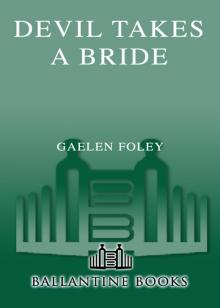 Devil Takes A Bride
Devil Takes A Bride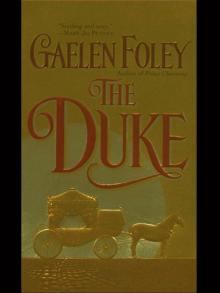 The Duke
The Duke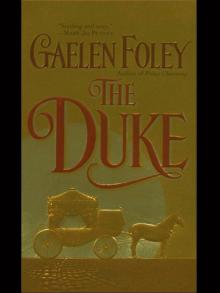 The Duke: The Knight Miscellany Series: Book 1
The Duke: The Knight Miscellany Series: Book 1 Her Secret Fantasy
Her Secret Fantasy Her Only Desire
Her Only Desire Lord of Fire
Lord of Fire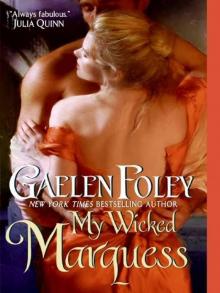 My Wicked Marquess
My Wicked Marquess My Scandalous Viscount
My Scandalous Viscount Duke of Secrets (Moonlight Square, Book 2)
Duke of Secrets (Moonlight Square, Book 2)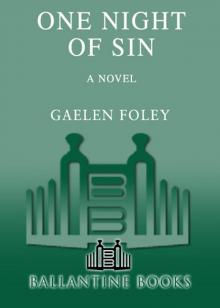 One Night of Sin
One Night of Sin The Secrets of a Scoundrel
The Secrets of a Scoundrel Dream of Me (Harmony Falls, Book 1)
Dream of Me (Harmony Falls, Book 1) His Wicked Kiss
His Wicked Kiss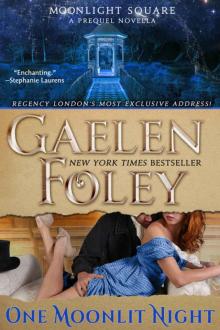 One Moonlit Night (Moonlight Square: A Prequel Novella)
One Moonlit Night (Moonlight Square: A Prequel Novella) My Dangerous Duke
My Dangerous Duke